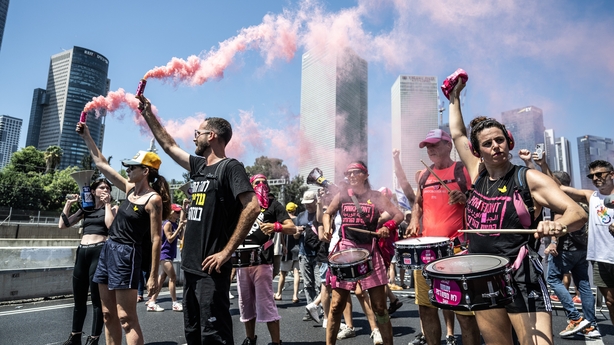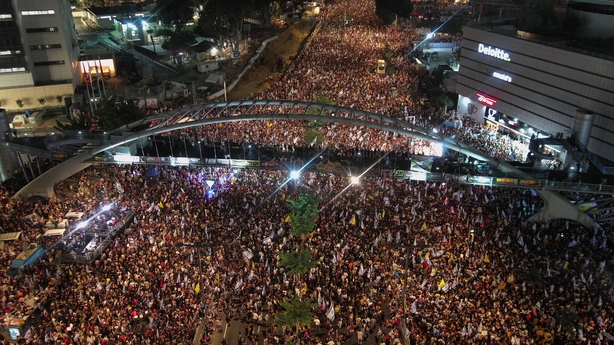Israeli Prime Minister Benjamin Netanyahu has said he is seeking forgiveness for failing to save six hostages whose bodies were recovered from a Gaza tunnel at the weekend.
"I ask for your forgiveness for not bringing them back alive," Mr Netanyahu said at a televised press conference.
"We were close but we didn't succeed. Hamas will pay a very heavy price for this."
Earlier, US President Joe Biden has said he was close to presenting a final proposal for a deal to release hostages held by Hamas in Gaza but that he did not think Mr Netanyahu was doing enough to secure such an agreement.
Mr Biden was speaking to reporters at the White House after Israeli forces over the weekend recovered the bodies of six hostages, including Hersh Goldberg-Polin, a 23-year-old American-Israeli, from a tunnel in Gaza where it said they were recently killed by Palestinian Hamas militants.
That has sparked criticism of the Biden administration's Gaza ceasefire strategy and ratcheted up pressure on Mr Netanyahu from Israelis to bring the remaining hostages home.
Asked whether he thought Mr Netanyahu was doing enough to secure a hostage deal, Mr Biden said "No." He did not elaborate.
Asked if he was planning to present a final hostage deal to both sides this week, the US president said: "We're very close to that."
"Hope springs eternal," he added when asked whether a deal would be successful.
Mr Biden and Vice President Kamala Harris were due to meet with the US hostage deal negotiating team to discuss efforts toward an agreement for the release of the remaining captives.
Israeli court orders end to strike amid hostage deal push
It comes as Israeli protesters took to the streets for a second day and the country's largest trade union launched a general strike to press the government to reach a deal to return hostages.
The strike disrupted transport and medical services in several Israeli districts and many shops and businesses were closed after the head of the Histadrut union, which represents hundreds of thousands of workers, called for a general stoppage.
The recovery of the bodies triggered a wave of grief and fury in Israel, prompting at least half a million people to take to the streets in Jerusalem and Tel Aviv yesterday.

The demonstrators are demanding Mr Netanyahu reach a ceasefire agreement with Palestinian militant group Hamas to bring the remaining hostages home.
Thousands again gathered in Tel Aviv earlier today, waving blue and white Israeli flags or holding photographs of the remaining 101 hostages aloft.
Professor Yehuda Ullmann, head of the surgery division at Rambam Hospital in Haifa, said strike action went against the grain of doctors dedicated to saving patients.
"But we are in a very, very hard situation now, we and all the country, because of the hostages. And yesterday it was maybe the hardest day," he said. "We can't stand aside and that's why we came into a strike."

Following an intervention by Finance Minister Bezalel Smotrich, Israel's Labour Court ruled the general strike must end at 2.30pm local time (12.30pm Irish time), saying the strike had no economic basis and was largely political. Histadrut accepted the ruling.
"We live in a country of law and respect the court's decision, therefore I instruct everyone to return to work at 2.30pm," Histadrut chairman Arnon Bar-David said, a day after he described the strike as "a cry for the return of the hostages".
Some services at Ben Gurion Airport, Israel's main air transport hub, were suspended in the morning, although incoming flights were still landing while bus and light rail services in many areas were either cancelled or only partially functioning.
Workers at Israel's main commercial port Haifa and some municipalities also went on strike.
Read more:
Latest Middle East stories
Hospitals were only partially operating and banks were not working but many private sector businesses were open.
The strike was backed by several employer groups including manufacturers and the high-tech sector, and many employers were allowing staff to join the strike so many services were disrupted.
The strike and street demonstrations follow months of protests by families representing some of the hostages and underscore the deep divisions that have opened up in Israel over Mr Netanyahu's approach to securing a ceasefire deal.

Despite pressure from his own defence minister as well as senior generals and intelligence officials, Mr Netanyahu has insisted on maintaining Israeli troops in key points of Gaza after any ceasefire.
Hamas has rejected any Israeli presence and despite the efforts of Egyptian and Qatari diplomats and repeated visits to the region by senior US officials urging a deal, there has been no sign of a breakthrough in talks to halt the fighting and bring the hostages home.
Hamas militants seized 253 hostages in the 7 October rampage through Israeli communities that killed 1,200 Israelis and foreigners and triggered a relentless Israeli assault that has laid waste to Gaza and killed more than 40,600 Palestinians.
